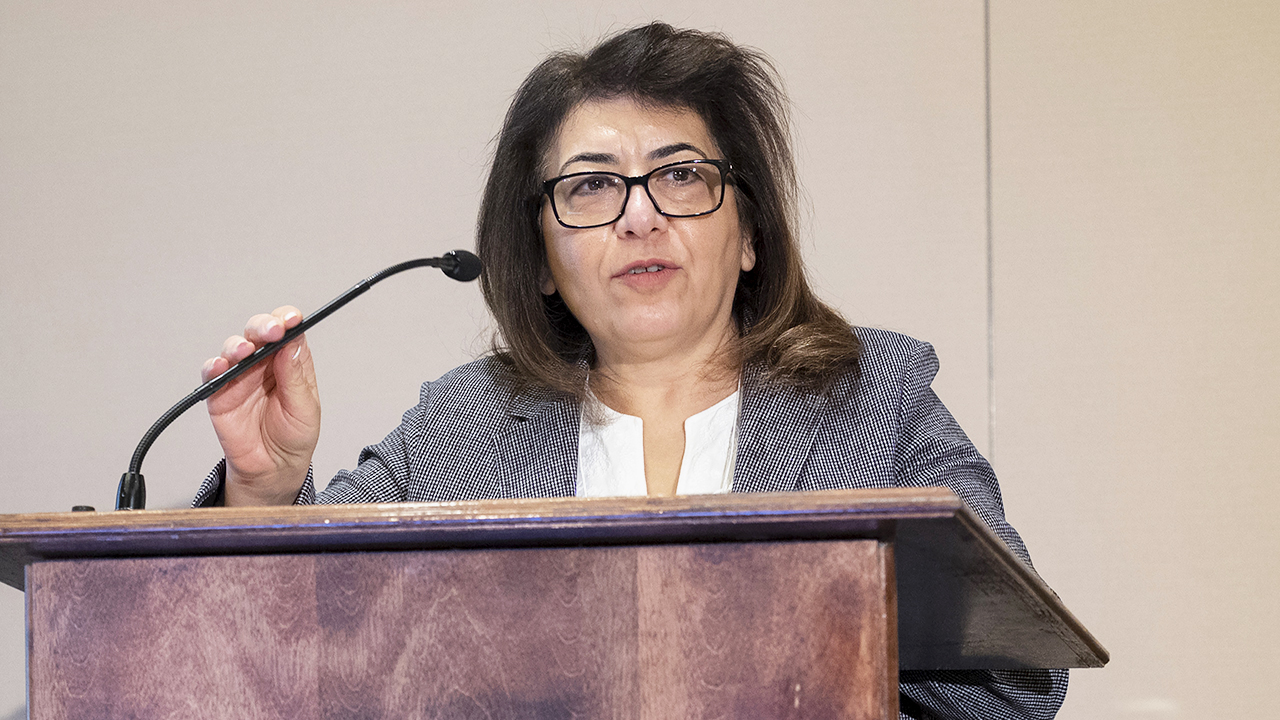- YouTube
- TikTok
Oakland University lecturer invited to speak at 2022 MLA Convention
Dunya Mikhail was a featured speaker in session entitled ‘Multilingual Poets for a Multilingual Nation’

Dunya Mikhail, an internationally celebrated poet and Oakland University special lecturer of Arabic in the Department of Modern Languages and Literatures, was a featured speaker at the 2022 MLA Convention, which took place from January 6-9 in Washington, D.C.
The largest scholarly meeting in the humanities, the MLA Convention brings together thousands of members to discuss new research, participate in workshops, and build their professional networks.
“I felt proud and happy to represent Oakland University in the 2022 MLA Convention,” said Mikhail, who was one of three poets invited to respond to the convention’s presidential theme, “Multilingual US.”
“As an immigrant poet, I am fascinated that poetry turned to be the country I return to,” Mikhail said. “First, a poem provides me with a space of discovery, and then, when it’s offered to others, they come to it as a shelter. They immigrate to it as they would an unknown place. They add their own meanings. They associate it with something familiar or unfamiliar. So through writing poetry, I feel like a citizen who welcomes the newcomers, as I was welcomed by those who came before me.”
At the convention, Mikhail participated in plenary session entitled “Multilingual Poets for a Multilingual Nation.”
“Linguistic patterns of various world languages are reflected in American poetry, especially in the poetry of bi- or multilingual writers, whose voices reverberate the diversity of cultures, traditions, and experiences,” Mikhail said. “As a result, new forms are introduced to American poetry; it becomes something new, larger, transformed.
“The sonnet, for example, comes from Italian poetry, and the ghazal from Middle Eastern and Indian poetry. My little contribution to the forms of American poetry is my poetry series called Tablets, which I call Iraqi Haiku. They are very short poems inspired by the Sumerian style of communication through images. I write them in Arabic first and then I draw them very primitively and then I try to translate them into English.”
The process of translating poems from one language into another isn’t always easy.
“To translate means ‘to carry across,’” Mikhail said. “In moving from one language to another, we carry ourselves across the borders and sometimes we smuggle our own stuff, our foreignness if you will, to the second language.
“As translators, we try our best to be faithful to the original,” she added. “But what does that mean? Does it mean strict fidelity to literal meaning? Does it mean producing a text that sounds as if it was written in the language to which it’s being translated? To what extent is the translator empowered to re-create? How much of the text’s foreignness could we preserve in crossing from a language to another? Every serious translator is concerned with such questions.”
In addition to poetry, sessions at MLA conventions may also focus on language justice; multilingualism in poetry, theater, and other forms; strategies for multilingual access in various settings; multilingualism and the public, urban, and digital humanities; multilingual medical humanities; multilingualism and history; pedagogic approaches to multilingualism, including at the K–12 level; translation, interpretation, and activism; bilingual education; multilingual approaches to national literatures; preservation and revitalization of Indigenous languages; sign languages and embodied communication; scholarly collaborations across languages and disciplines; public humanities projects that engage multiple languages; and more.
“The MLA can play a crucial role in imagining and supporting a linguistically diverse commons, to make language a tool of inclusion rather than exclusion,” said Barbara Fuchs, president of the Modern Language Association. “For those who care about the humanities, exploring and promoting multilingualism is one of the most significant contributions we can make to a diverse public sphere.
“At the same time, reconstructing multilingual roots productively complicates the history of the nation-state — particularly for the United States but also for many other polities, especially settler nations whose indigenous and interimperial pasts have been occluded. Our theme for the year was thus both contemporary and historical — an invitation to highlight the importance of contemporary multilingualism, while attending to the complex histories and erasures that have led to our present condition.”
For more information, visit the 2022 MLA Convention website at www.mla.org/Convention/MLA-2022.
To learn more about the Department of Modern Languages and Literatures at Oakland University, visit oakland.edu/languages.


 January 27, 2022
January 27, 2022